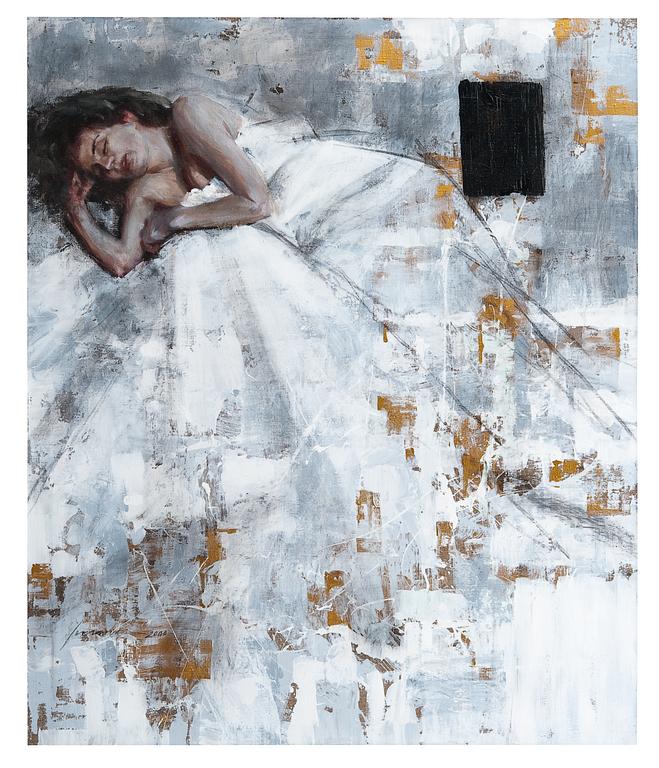Ilkka Lammi
"SLEEPING BEAUTY, II VERSION".
Sign. 2000. Oil on canvas, 124x105 cm.
Provenance
Bought directly from the artist.
More information
The female figures of Ilkka Lammi
Who is the Sleeping Beauty in Ilkka Lammi’s (1976 - 2000) painting? Is the sleeping woman a random model, the artist’s loved one or perhaps a character Lammi spotted passing through a crowd? The answer to that question is all but an enigma in itself. Ilkka Lammi’s Sleeping Beauty is not one specific woman but she embodies many women simultaneously.
Ilkka Lammi’s portraits are manifold, and along with nature, people are his most frequently recurring motif. About half of Lammi’s total production are person pictures. Part of them are commissioned portraits; he sporadically worked on commission ever since he was a schoolboy. Members of Lammi’s inner circle frequently became the targets of his creativity, either voluntarily or by persuasion, at times even unwittingly. Lammi portrayed his family and fellow students engaged in everyday chores without beautifying them and often making them appear older that their age. Another category of equally rugged human figures is the collection of strangers in whose faces or appearances Lammi found something of particular interest. Ilkka Lammi was an aesthete, but only as far as the inner harmony of his pictures is concerned, not with regard to the looks of his models. The models were often unknown persons busy at work or on their way somewhere - you will find fishmongers as well as museum warders in Lammi’s paintings, drifters or crooks as well as random figures picked out in a crowd.
A more mysterious ensemble is that of Lammi’s numerous female portraits, of which Sleeping Beauty is a good example. There are several paintings showing a dark-haired, languorous woman either asleep, looking away or curling up as if to revert into her inner world. These figures are found among the exaggerated, powerfully passionate women from the years 1998-1999 as well as among the frail shapes that merge into an abstract background from Lammi’s final period (1999-2000). The women as such are never real, actual persons that once existed. Nonetheless, Lammi’s personal history is crowded with dark, tall and introverted female characters almost to the point of congestion. Such were all of his infatuations and girlfriends as well as his own mother. The recurring female figure in his paintings bears the traits of all of them. This dark female - sometimes vulnerable and frail, sometimes haughty and rejecting - was Ilkka Lammi’s ideal woman and he tirelessly kept portraying her all through his artistic career.
People aren’t always the primary subject in Ilkka Lammi’s paintings. The people in his initial portraits are first and foremost important objects of practice on his journey towards mastering painting techniques, and Lammi’s approach was that of a researcher, as it were. These characters were followed by strong and surprising paintings in which women look the viewer in the eye almost intrusively, with a demanding expression. Toward the end of Lammi’s career the female figures become increasingly delicate and they adjust to their abstract background, blend in with it, to eventually disappear altogether.
Ilkka Lammi considered himself a romantic but the figures in his portraits are never sugary, nor, at a closer look, do they even try to please the viewer - let alone the sitter herself. What mattered to Lammi was how the painting worked as a whole and how its message was conveyed to the viewer. Lammi himself concluded in 2000: “I try to observe the pictures naively: how things work graphically, that is, how the proportions of, and the relationship between the surfaces as well as their composition and colours work together. The other aspect concerns the mood conveyed by the picture and ideally these two sides complement each other. I have a lofty perception of art”.
Katri Kalijärvi (born Lammi)










































